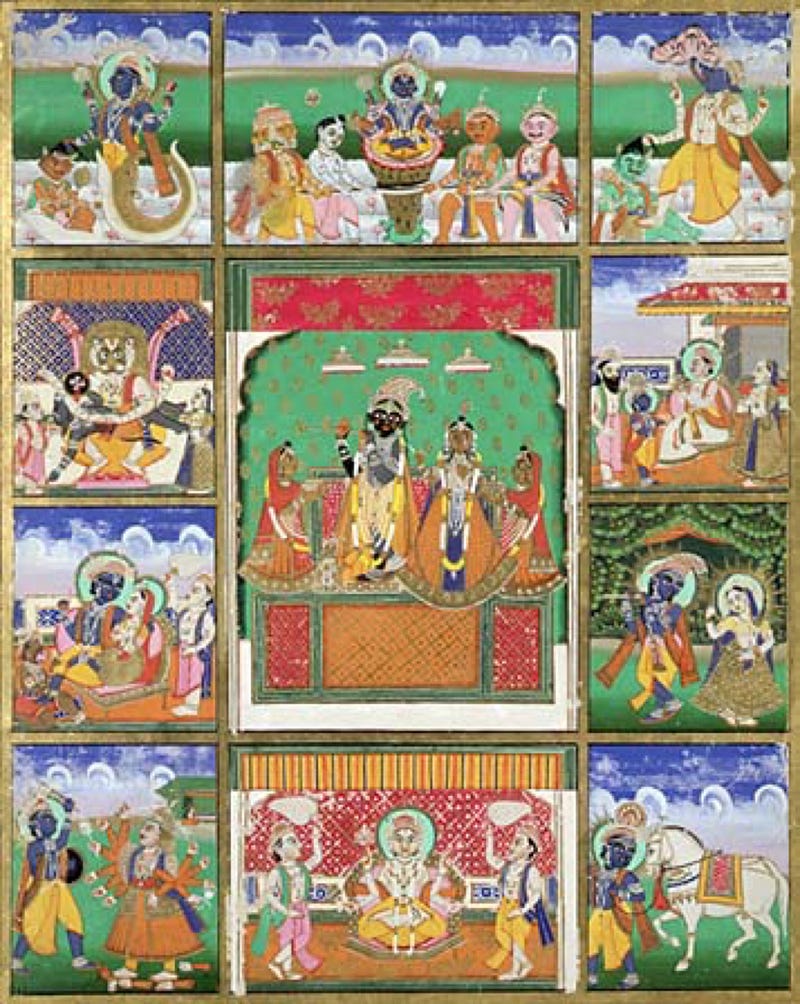King Dhritarashthra is the father of the 100 Kaurava brothers, including Duryodhana. Dhritarashtra was born blind. His mother Queen Ambika had been originally wed to King Vichitravirya; however, Vichitravirya had died without having any children, so in order to continue the noble bloodline, Queen Ambika used the prestigious Niyoga method. However, while completing this method, she closed her eyes, thus causing Dhritarashtra to be born blind. Dhritarashtra fathered the 100 Kaurava brothers with his wife Queen Gandhari.
When Gandhari was born, she was cursed so that her first husband would die. So in order to get over this curse, her father set up a marriage ceremony with a goat. At the altar the moment the marriage was complete the goat died. Thereby freed of the curse, Gandhari was free to marry anyone she wished to marry. Thus she was married to Dhritarashtra. Later when Dhritarashtra found out that he had married someone who had been married before, as Gandhari's family had lied and said that she was a virgin, Dhritarashtra grew angry and imprisoned Gandhari's family and only gave each of them one handful of rice per day to survive. Gandhari's father mandated that the family give all of their rice to their one son Sakuni who was the most cunning, so that he may survive and exact revenge upon Dhritarashtra and to bring about the ruin of the entire Kuru clan once he got out of prison. Gandhari and Sakuni's father then twisted and broke Sakuni's leg so that Sakuni would always have a reminder of the twisting hunger for revenge that his family felt.
Since Dhritarashtra was blind, the crown was passed over him to his younger half-brother Pandu, who had fathered the five Pandava brothers. However, when Pandu passed away, the crown fell back to him. He appointed Sakuni as his royal adviser as per the request of Queen Gandhari.
 |
| Figure 1: We see King Dhritarashtra listening to the counsel of Sakuni. Sakuni speaks of the great war Mahabharatha |
Many people have negative opinions of both characters.
-----------------------------------------------------------------
Disability is seen as a way of balancing karma that is accumulated in one's previous lives. Accumulation of positive and negative karma is usually reflected in the next life, affecting physical and mental health and prosperity. In many cases, people who are disabled or who possess physical and mental impairments are said to have accumulated negative karma in their previous lives. The pain they feel in this life is a result of the pain they caused to others in a previous life. This act of suffering is often equated to a way of paying for their mistakes, a form of recompense to balance their karma. In a way, it might also be a part of their dharma or duty in the current life to understand the pains of the world through having a disability or an impairment. Keeping this sentiment in mind, many people consider disabled people to be incompetent or evil, regardless of their rebirth into a new life and their subsequent suffering. They are extremely wary of this "evil" and despise them because of this.This sentiment is echoed in the Mahabharatha. In this scene, Duryodhana is seething in jealousy over the fact that the people of the kingdom are waxing eloquent about Yudhishthra and not him.
"one unforgivable offence of the Pandavas in the eyes of Duryodhana was that the people of the city used to praise them openly and declare in seasons and out that Yudhisthra alone was fit to be king. The people would flock together and argue: 'Dhritarashtra could never be king for long for he was born blind. It is not proper that he should now hold the kingdom in his hands for any longer'. "
In recent modern times, people have also been equating disability with incompetence, although this may just be a transference of the myths and ideals that run rampant in the Western World. This is seen and reflected in the curses of disobedience section of Deuteronomy 28:37. Disobedience to God will cause immense pain and change upon you that others will look on in horror.
.jpg)





